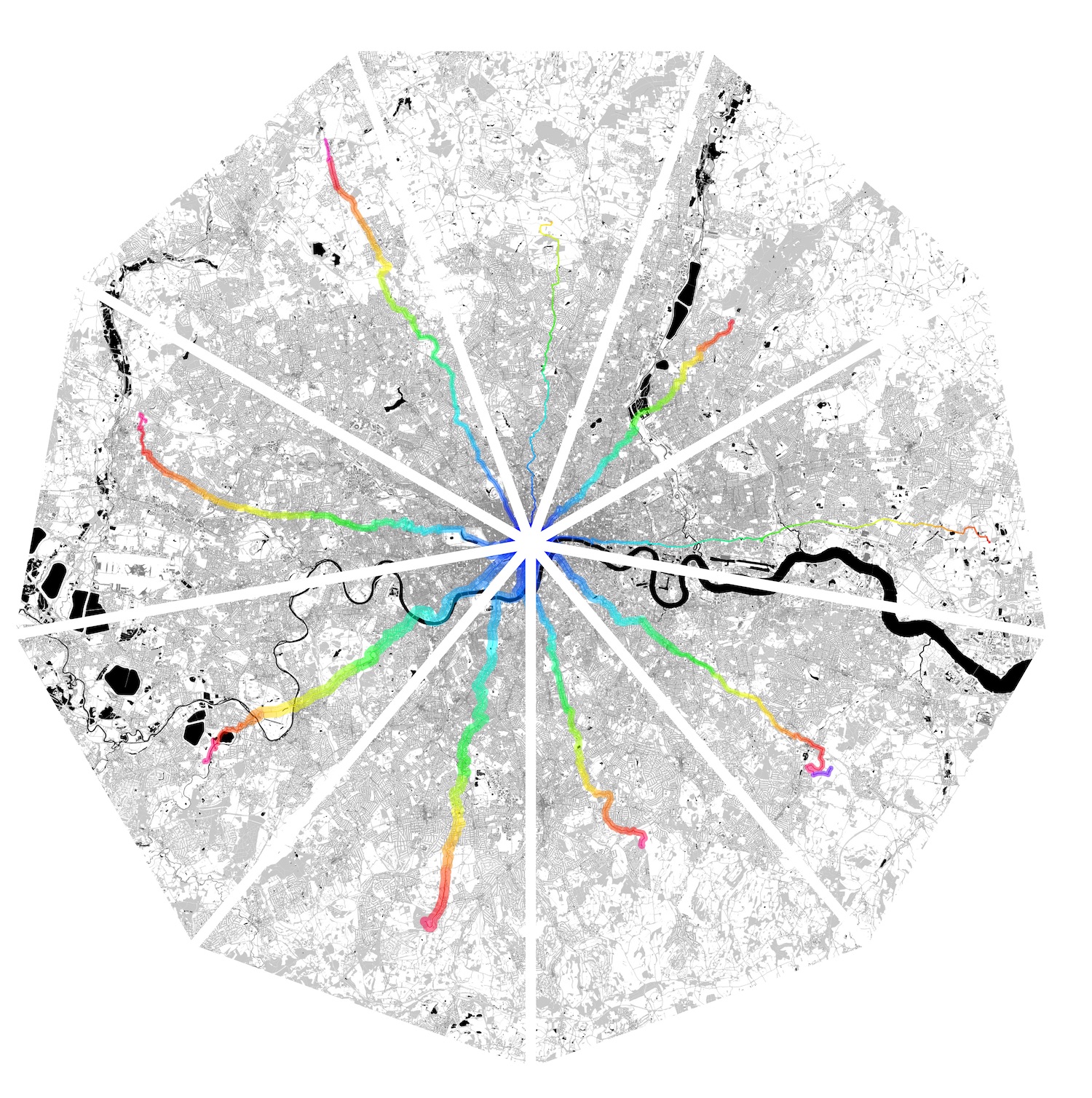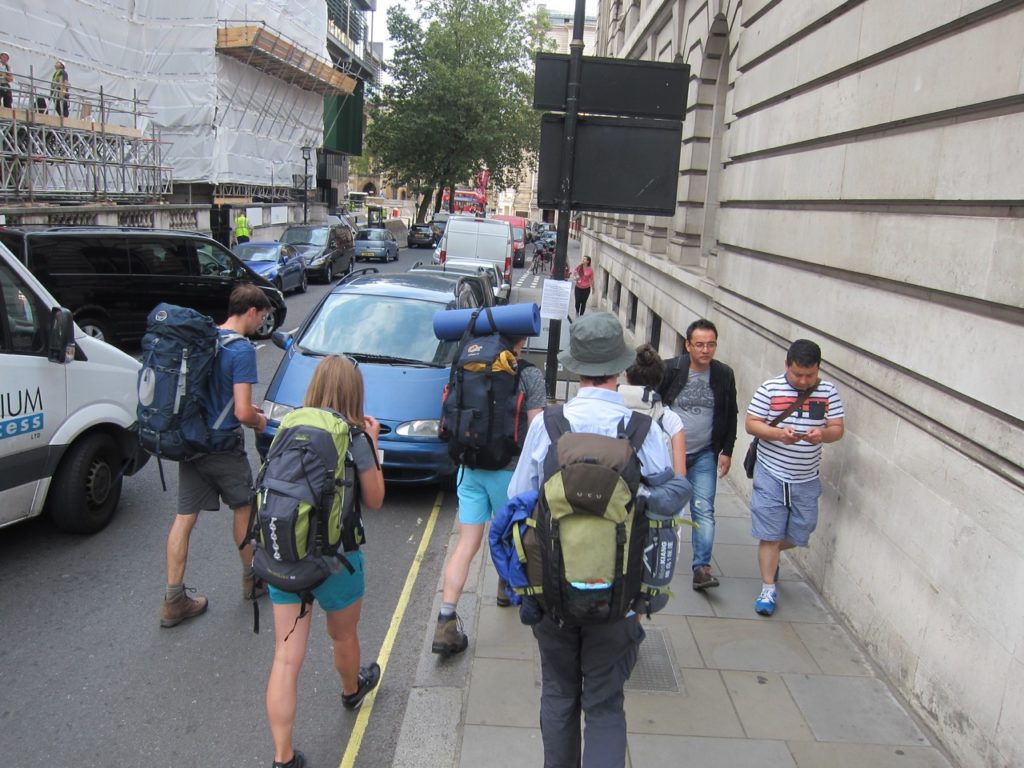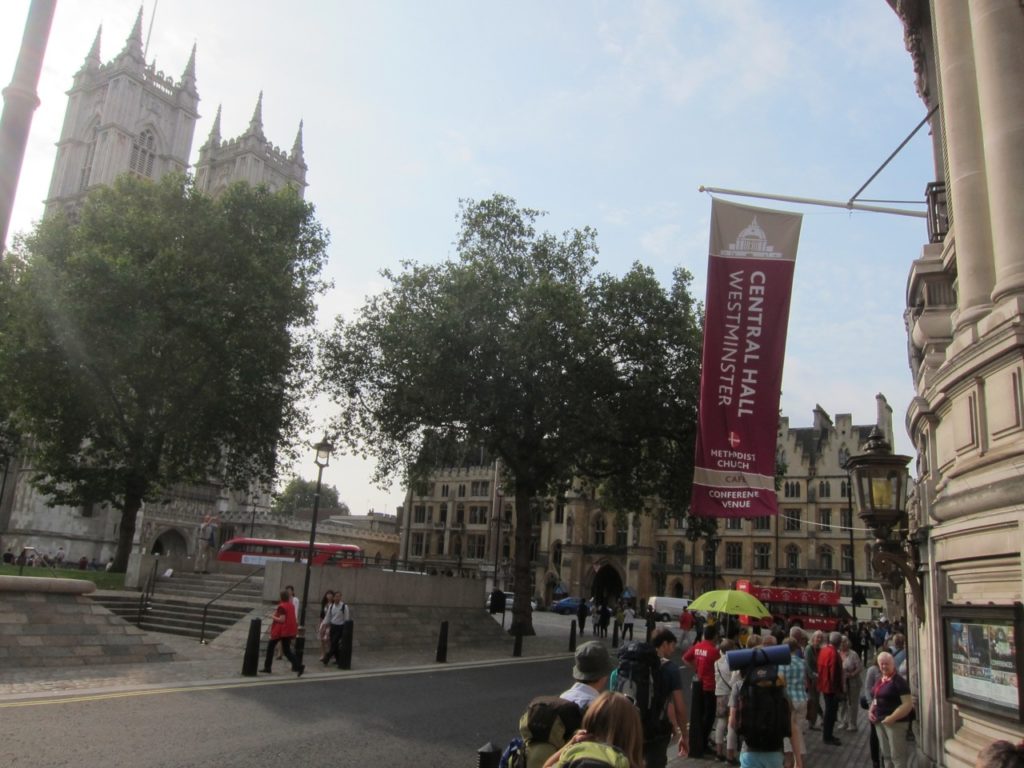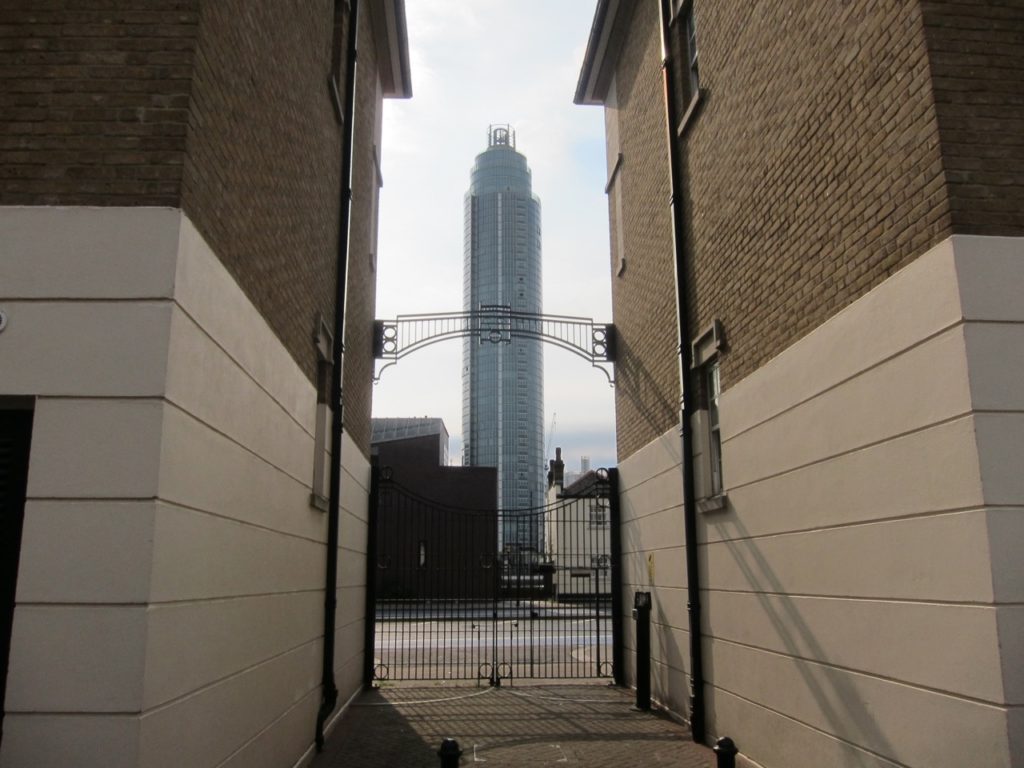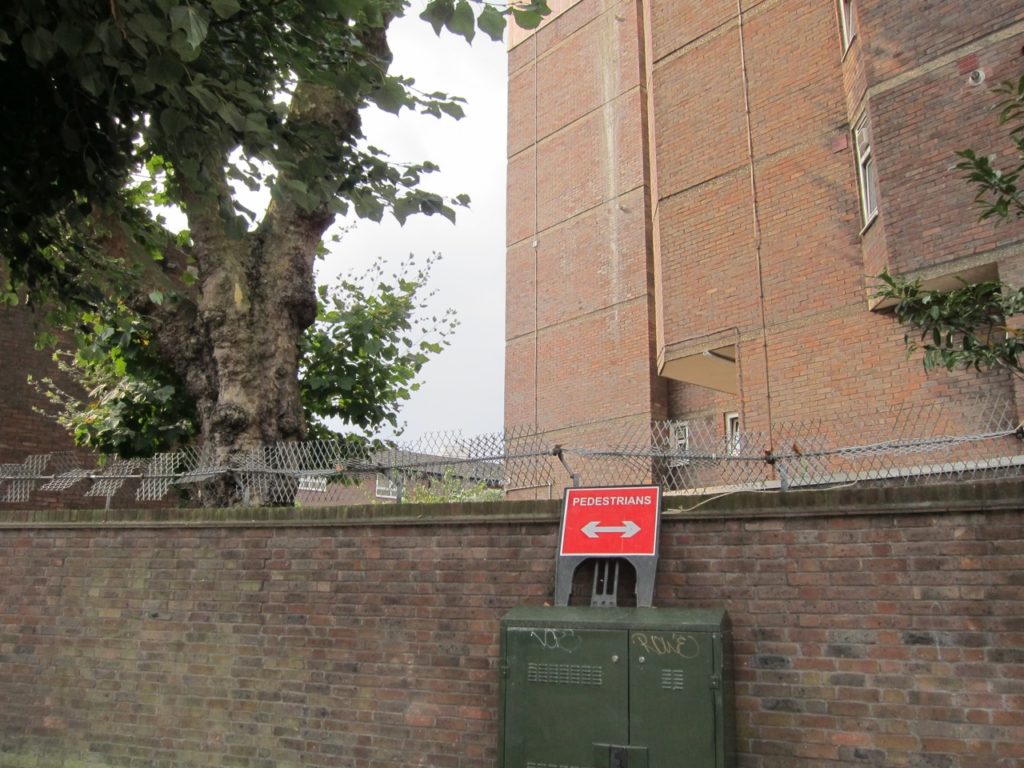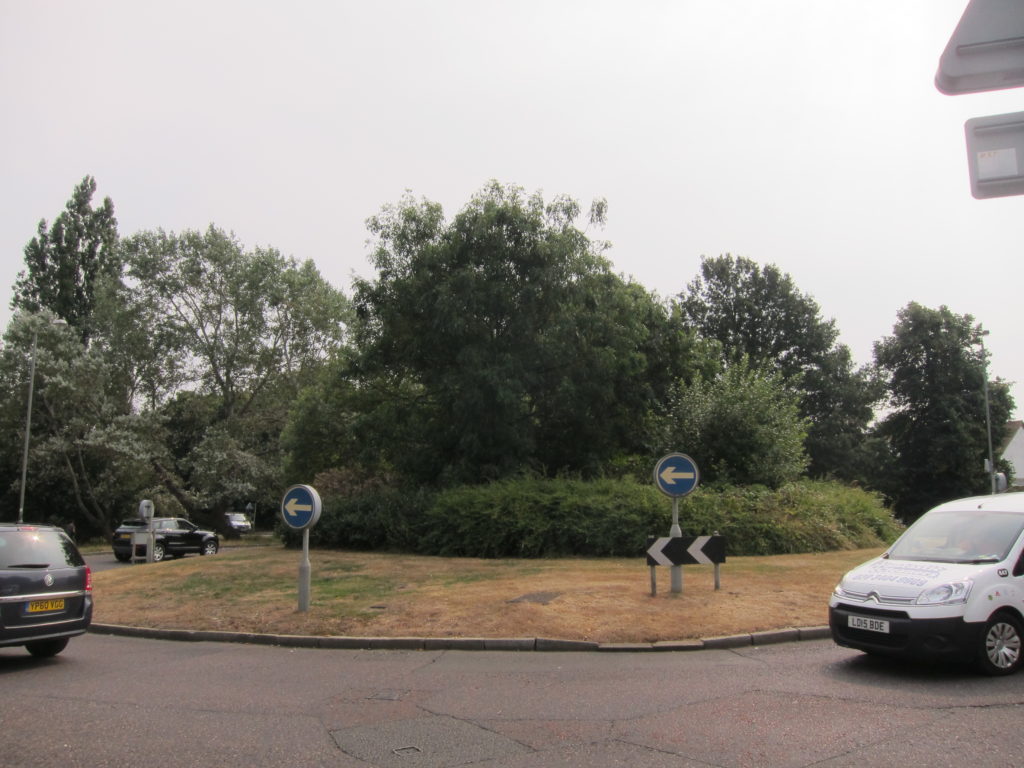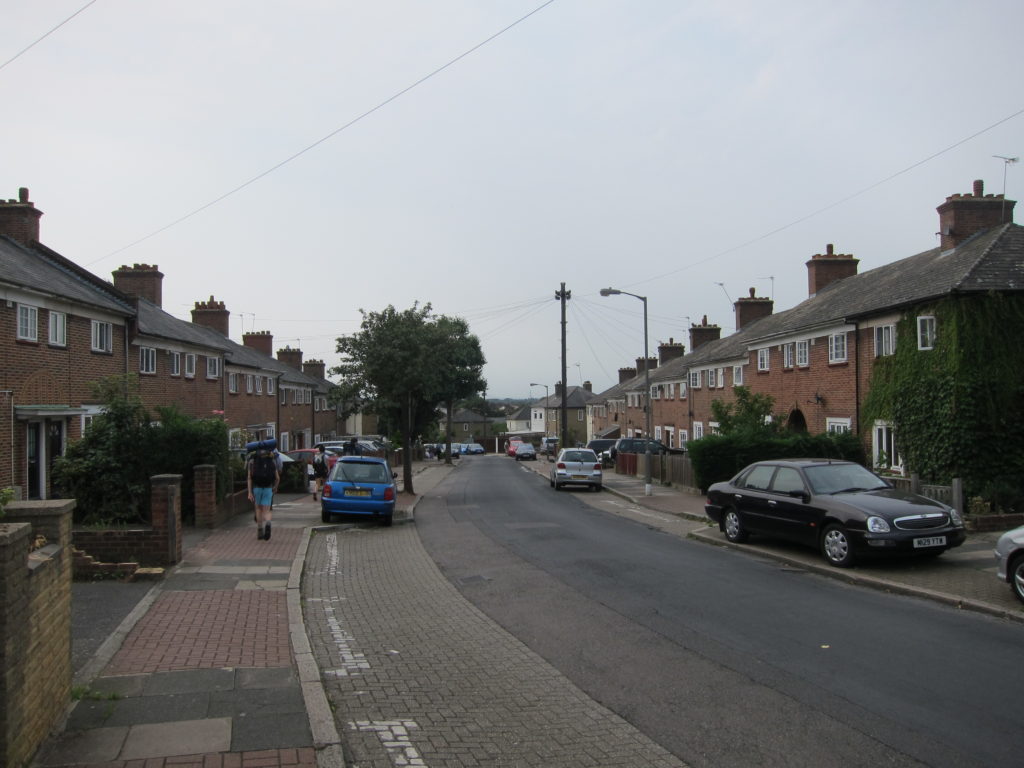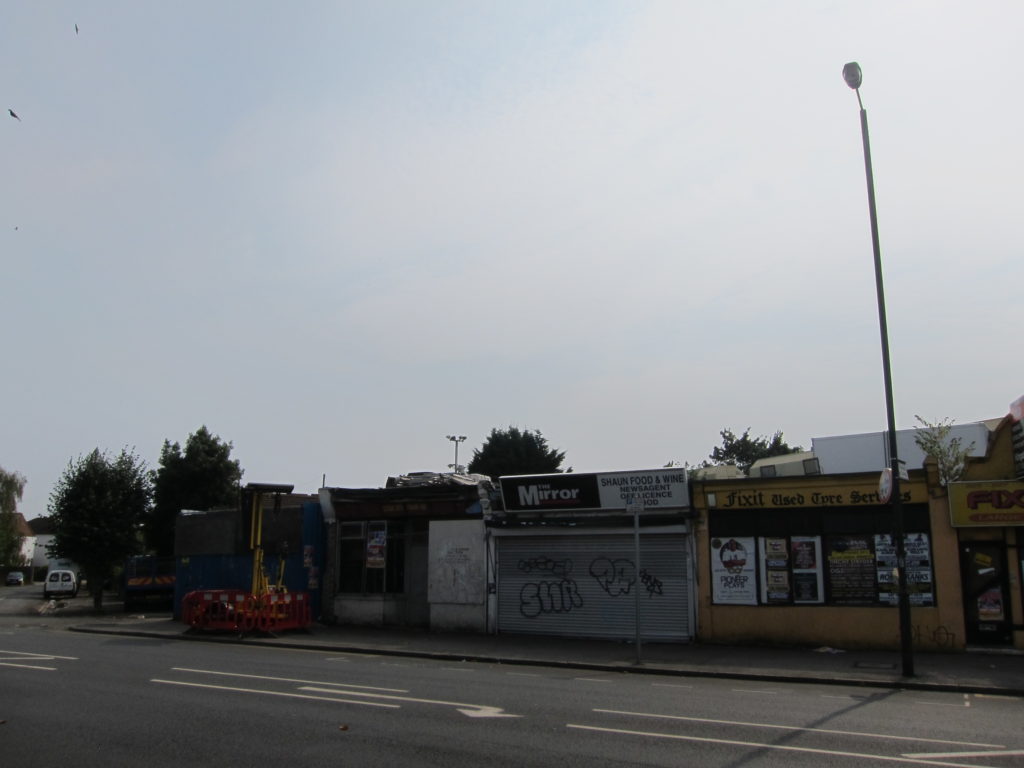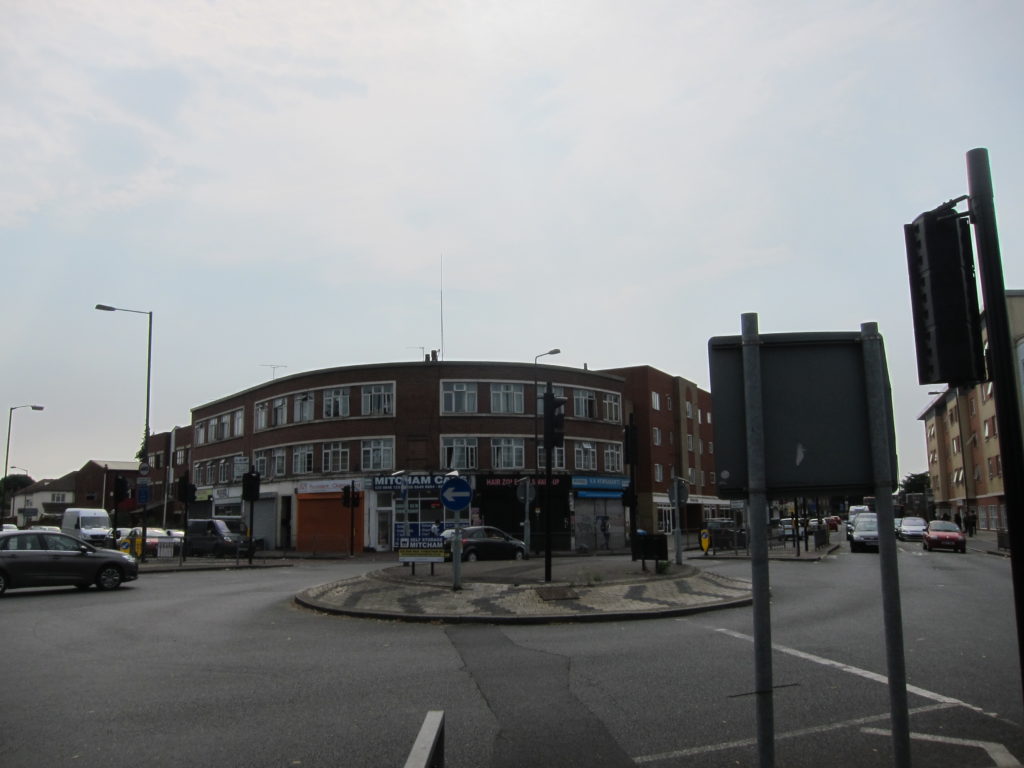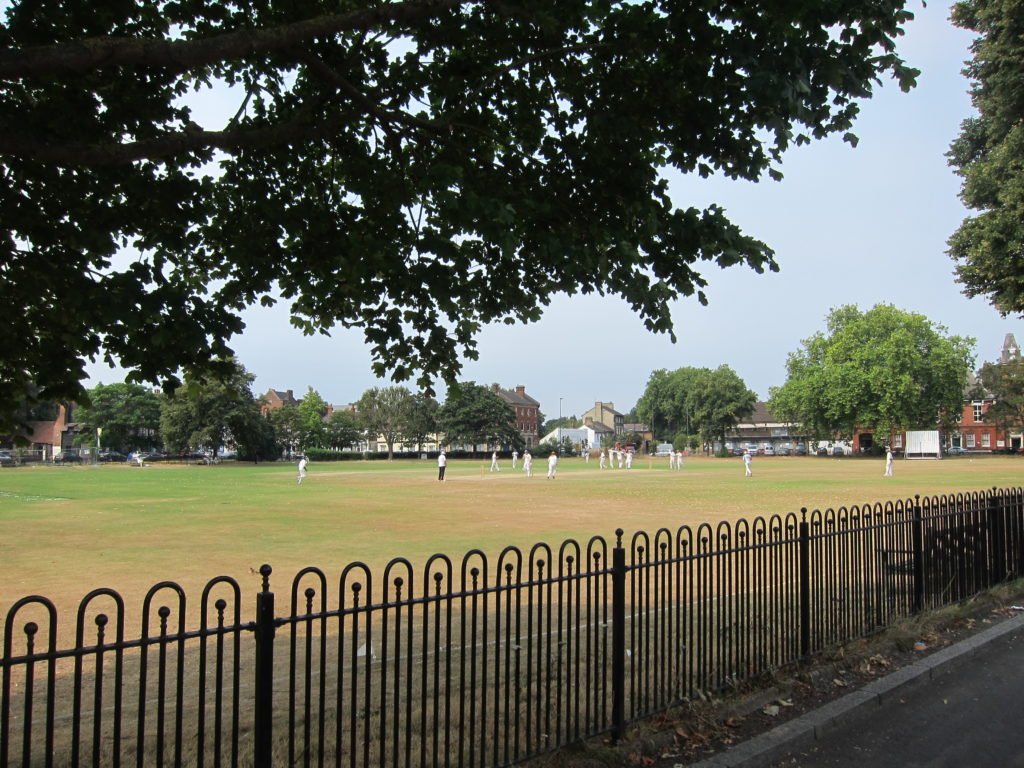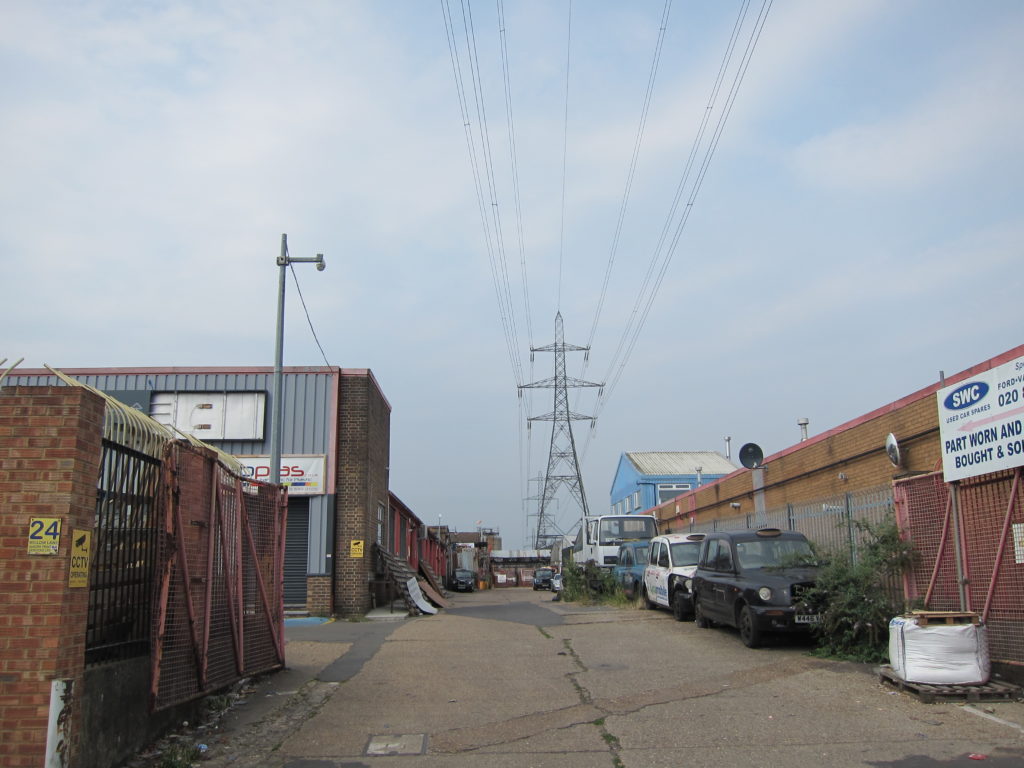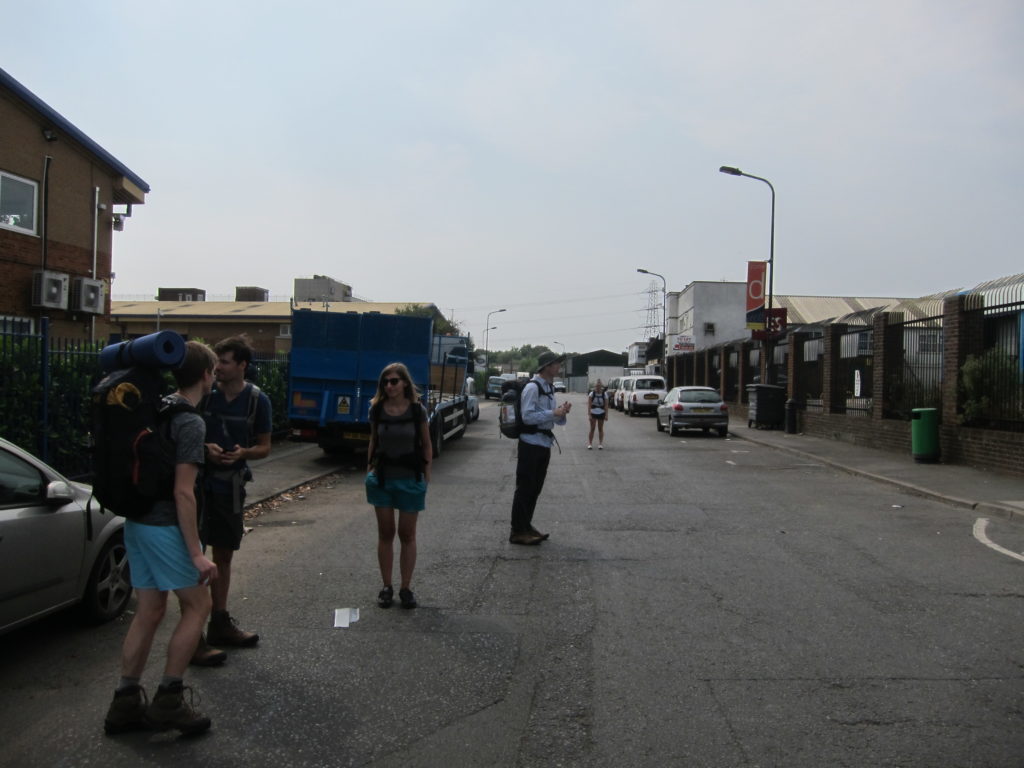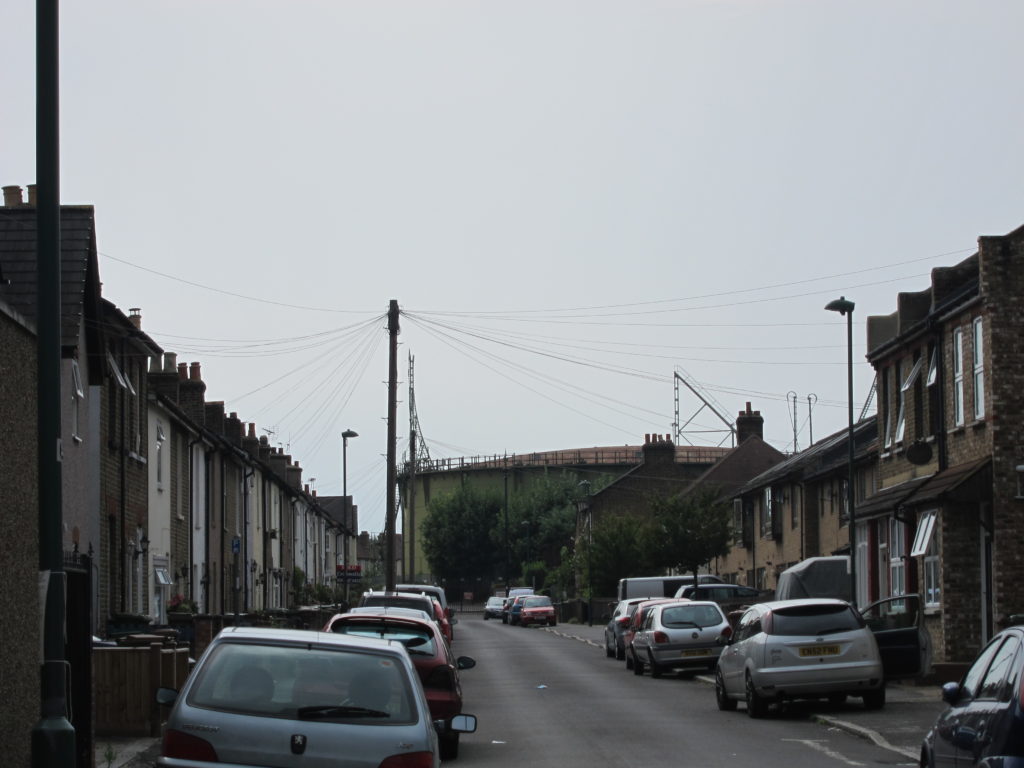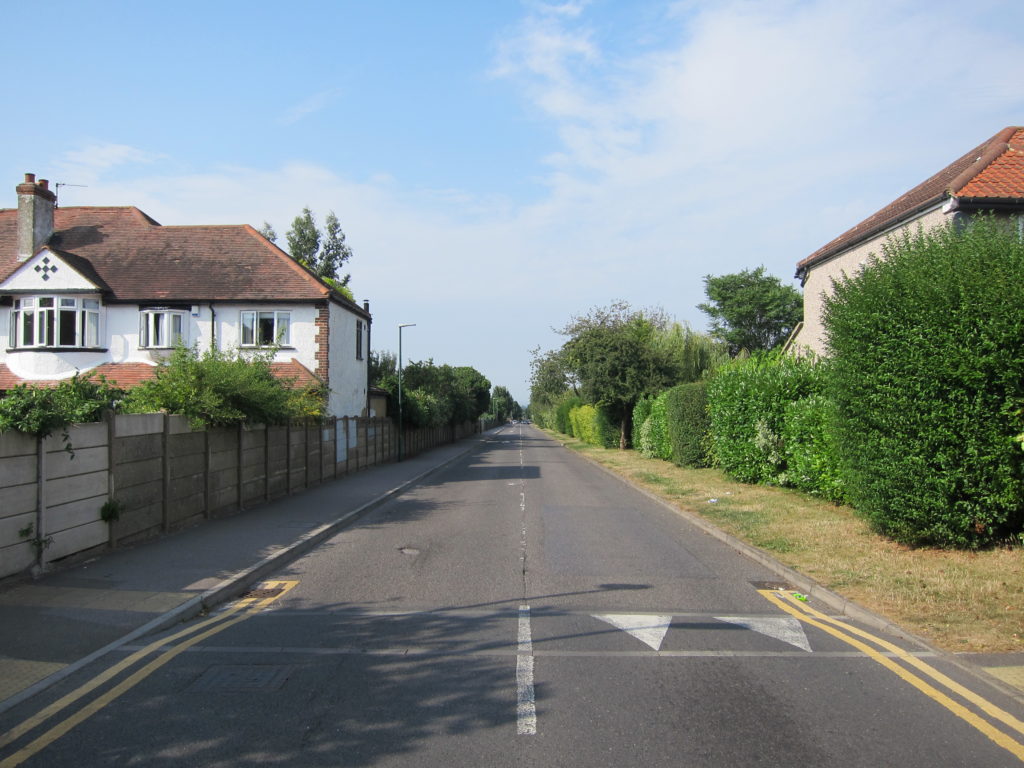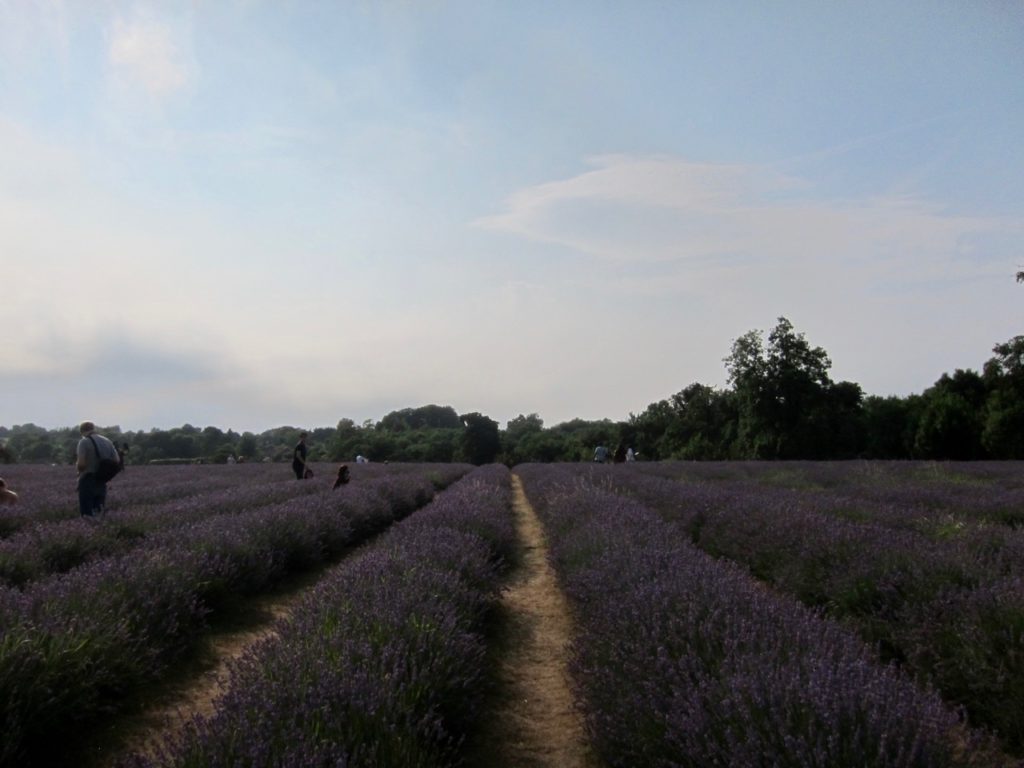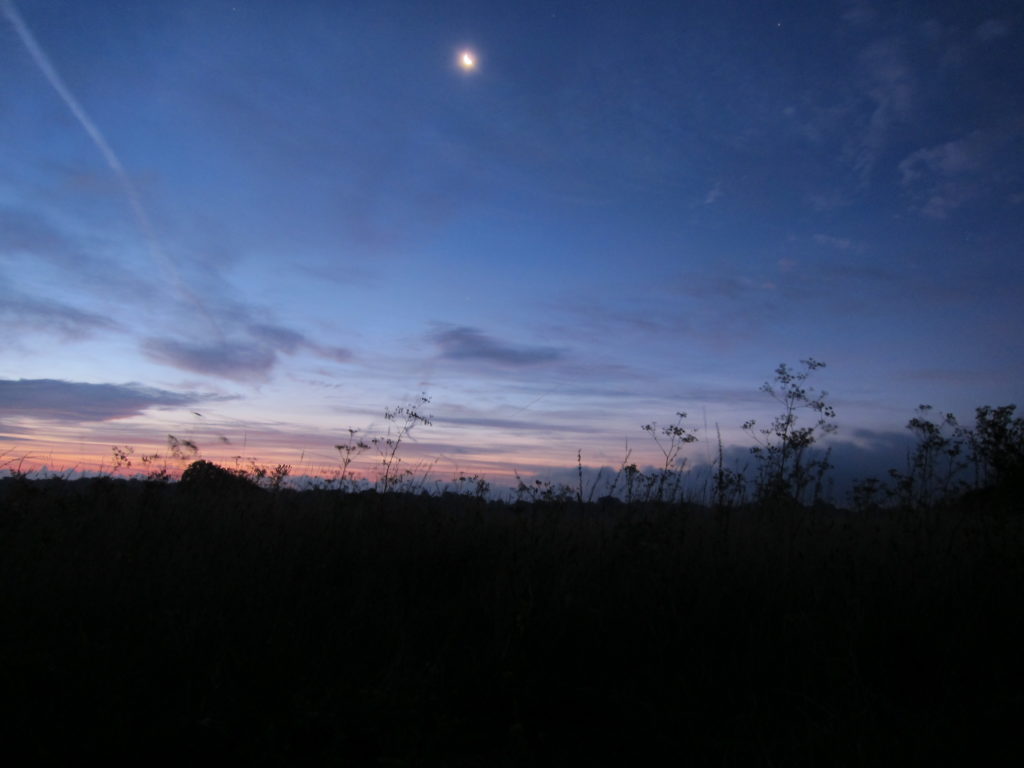We had woken at 6am. Tom texted me. Could I bring my stove? I was afraid not — I wasn’t going home. I had stayed at Sarah’s; she was flying to Cornwall, while I set out for the walk, intent on catching the corresponding flight from Gatwick the following morning to join her. I had figured that wherever I slept would be close enough to find my way to Gatwick.
I walked Sarah to her train. I had two hours before needing to be at Charing Cross. I sat in a park for a while, then got blueberry pancakes and coffee. I felt incongruous with short shots, and a backpack with hoodie and a bottle of water strapped to it, but no-one cared. When I finished I walked to Charing Cross, stocking up on another coffee.
I had packed only carry-on luggage in my regular daypack. I’d managed to squeeze in a sleeping pad, sleeping bag, and a plastic sheet to rig over a nylon cord in case it rained. I also had dried fruit and tortillas, toiletries, a notebook, my compass, camera, passport, and smaller odds and ends.
Arriving at Charing Cross, I saw a man I didn’t recognize sat at the roundabout. He had a sunhat, a backpack, and a tent. I asked if he was a friend of Tom’s, which didn’t seem to register. He responded he was there for the walk. Bill was British, but in London for a few weeks before heading home to China.
Next, a couple arrived with backpacks, Richard and Aina, Tom’s friends. Then Tom and Larena. It was good to have four who hadn’t been on a previous walk. A new vibe.
Soon we were ready, and set off, a merry band, across traffic and onto the Mall toward the Palace before veering south. I felt the familiar conflict of chatting with people, navigating, and taking notes. Thankfully Richard and Larena had brought compasses, so I wasn’t alone in route-finding. Bill talked about his work as a performance artist. We discussed the significance of Brexit on art and science. An ambulance passed on the side of the road; tourists milled around.
We walked past Westminster Cathedral, across a plaza with strings of tourists, and along a road with commercial buildings. The road delivered us into a leafy residential area paralleling the river. I talked with Aina, and Richard. I told Aina of our previous golf course escapades. Tom recounted Jura to Bill. “Isn’t that where Orwell wrote 1984?”, Bill asked. I thought about the KFL burning a million of their own pounds on the island.
We scuttled across a busy road and were filtered into a new housing development near the river. We were blocked by a gate that needed either a key code or a swipe card. We toyed with climbing it, but there were too many people around, it was an affluent development, and there were six of us, leading us, ultimately, to turn back, back onto the road. Bill accidentally kicked a small pristine wrapped cake that lay on the pavement, and picked it up, excited by his find.
We crossed the road, including a cycle highway, painted in blue. On the far side we found the river. The pavement became a path along the riverside, which we followed, soon turning in from the river to a hip-height locked gate, which we clambered over. Bill told me about a recent art residency he had in Northumbria, involving a walk, a performance, and a large Chinese dinner put on by his in-laws. Larena and I talked about time management, self care, and importance of taking time to oneself. It seemed that neither of us had much time for that. We chewed over the possibilities of a Scotland trip the following Easter. Larena said that she would have essays due, but agreed that it would be good to make it happen.
At the end of a stretch of riverside pavement we turned onto a bridge, entering Battersea between the power station and the park. Should we go into the park? No — the compass indicated that we continued along the road, past modern flats, and Battersea power station. The flats looked like a gargantuan cruise ship. I lingered behind the group a little. It felt good to have a little time and space to myself. Topless men jogged past. Was this the new populace of Battersea, living aboard the landed cruise ships?
We continued. Along a long, long South London road, and into Queenstown. I talked about the PCT. The road ascended a hill before we became entangled with a railway line, which diverted us alongside, then beneath it, though a tunnel.
Eventually the long road led us to Clapham Common. In the middle, at a cafe next to the bandstand, we stopped, taking it in turns to go to the toilet. I asked the staff if they would mind filling my water bottle, and they obliged. I was carrying only a single one-and-a-half litre bottle. We shared some food, standing—it was good not to be sitting. The weather was close, hot, but, thankfully, overcast. Bill ate his found cake.
At 11am we moved on. Bill’s evident knack for foraging yielded a bottle of water from a table. We crossed the park, enjoying the ease and luxury of following the compass directly, stepping easily over low fences. Past a pond, and suddenly we were at Clapham South tube station. Throngs of twentysomethings milled around. We turned right, down a major street. I seemed to remember being on this street once, when visiting London, stopping at a greasy cafe for a breakfast sandwich one morning. I used to really enjoy having an hour in a cafe with a paper when I visited London. We walked on; I talked with Tom. About walks, about friends, about getting sick.
Further on, we passed Balham tube station. A diagonal crossing at a crossroads was joyous, the road commandeered by pedestrians.
A long straight road out of London on our desired trajectory was quick, but uneventful. A promising staircase between shopfronts failed to yield the secluded walkway that we had hoped for: Tom explored the staircase, and came back down grinning, although there was no way through. We marched onwards, talking of critical mass, and other urban bike rides.
Soon, I joked that I had luncheon anxiety. Was lunch going to happen? I suggested 1pm as a good time, which everyone agreed with. We were in Tooting Bec, and the compass indicated that we turned into a brown-brick housing estate. The main road’s gravitational pull was always slightly left of our desired direction. We resisted by turning right, up the terraced street, then left. The street brought us to a roundabout; suburban, car-centric, with distances and space on a less human scale. The roundabout contained a picturesque crop of trees surrounded by a healthy ring-shaped bush. Since I was a child I’d fantasized about camping in the centres of roundabouts, blind-spots to passers-by, sanctuaries. Was this a common childhood mental game, like imagining your eyes were lasers as you sat in the back of the car, trimming paralax trees and telegraph pylons, into the distance? Waiting to cross the road triggered some of us to retrieve provisions, and before we knew it, it was an impromptu pitstop. It was fun to pause in the barrenness.
After, we walked on, the streets suburban, with terraced houses, telegraph poles, cherry trees, an assortment of mongrel cars, and faded road markings. We were heading west of the Crystal Palace hills, straight toward the Surrey hills, and we could see trees on the horizon, although we knew, as ever, these were illusions of an easy day.
The road was on a perfect bearing, so it was frustrating to come to a T-junction, with both branches orthogonal to our desired trajectory. We consulted our compasses in futility. A man walking on the other side gestured the right-hand path. “Toward the station”, he remarked. That seemed sign enough for us to take the left hand path. The road went on forever, brutally onward, a never-ending suburban terrace, hot and oppressive. Inspired by the heat, Richard and I agreed on how good an occasional can of Coke is.
Ultimately we emerged onto a busier road. The terrain was barren, concrete, with few trees. Shopfronts had more plastic, and everything was dirtier. Railings on the side of the road were rusty. A few shops were closed, with graffitied metal shutters. We stopped at the Riva Cafe for Larena to use their toilet then shouldered our packs and moved on.
Next, a low concrete roundabout ringed with dirty black and white bricks that made arrows. Then, a sign for Mitcham Eastfields station. We passed into a pedestrianised shopping precinct, with chain shops, people smoking, a chain pub, and signs for a funfair ziptied to railings. Part of the pedestrian area had been dug up and surrounded with barriers. Then we were out of the precinct, and onto a long road out, with a farewell “Thank you for visiting” sign.
Abruptly we seemed to be in the English countryside. Mitcham Cricket Green was groomed and picturesque, with a game in full flow, and it gave the illusion that we’d left London. We flirted with the idea of stopping early for lunch, but elected to push on. Occasional cool breezes were welcome in the heat. We crossed a grassy tree-ringed field next to the cricket pitch, crossed a busy main road, and passed a burned-out pub seemingly being refurbished, although aggressive signs indicated that it was a residential property, and not to enter.
We reentered suburbia by a cul-de-sac that funnelled between a densely overgrown patch of trees and brambles, and a railway track. It was shady and lush, with leaves and sunlight scattered on the pavement. Dogs barked behind a wall. I stopped to pee, then lagged behind the others. Buddleia sprang up on either side of the tracks. A few minutes later we were delighted by loaded blackberry bushes and, after another few minutes, a plum tree hanging over the path from a garden. I picked six plums. One each.
Crossing the railway on a bridge, we could see the tall mosaic’ed tower in Croydon. On the other side of the tracks we found that we’d descended into the Willow Centre Industrial Estate. It was hot, glaring, grimy, with low-grade litter lying around, and ripe with possibilities. Warehouses; two-story commercial, and light-industrial buildings; closed cafes advertising all-day breakfasts; weeds poking through cracks in the concrete; dried-out lavender bushes in front of one of the buildings. Neglected; space.
At the end of the road we found a double-decker bus parked, painted black with gold stars and a large ‘Club Class Bus’ emblazoned on the side, still littered with flimsy red plastic cups and bottles in the windowsills of the top floor. The sliding windows were open. I wondered if anyone was sleeping inside. Memories of being on band tour, waking up hungover on a beach in Belgium in the heat of summer. Beside the road was a car park, on the far side of which was a hidden stream, deep with fast-flowing water. Blackberry bushes dangled into the water. A sign confirmed ‘Danger — deep, fast-flowing water’.
We walked out of the industrial estate and onto a main road. I was lagging, tired. The road passed across wet grasslands with willows, and the heat was incessant. We had more views of the Croydon tower. After a few hundred metres of the grasslands we crossed the River Wandle, replete with watercress. A map on an information board told us that were close to a small park, and we agreed that it would be ideal for lunch. We walked along the path through green space that insulated the river from the suburbs, which, after a few minutes, opened out into the park. We crumpled onto the ground in the shade from a row of tall, leafy plane trees. Two guys wearing camouflage shorts and black T-shirts sat in a nearby shelter, drinking.
We took off our shoes and boots, stretched, and ate. I wasn’t feeling great; I was still recovering from an arduously long illness, but I was coping. Bill volunteered some high-class peanut butter for my malted raisin loaf. We continued stretching while we ate. Tom wandered over to the adventure playground, barefoot, although no-one else had the energy for such optional explorations. Conversations were sparse. I wasn’t daunted for the afternoon, but I also wasn’t exuberant. I knew it was still many hours until we would finish.
An hour later, it was time to move on. We returned to the path, and a housing estate. Terraced houses; I talked with Larena as we walked up another long suburban road. We passed allotments, and more low brick terraces. An imposing gas tower sat pregnant at the top of a perpendicular road. Spotting a bus stop leading to Morden, we wondered if we were approaching Morden, or whether we had passed already? I knew it was the end of a tube line.
After half an hour we reached a nice little park. A couple embraced on a tree trunk in the shade. A woman asked whether we had just came from Tooting? She had seen us walking through this morning. Bill pointed out a mulberry bush. I don’t think I’d ever had mulberries before, and found them incredible, perfectly sweet, particularly five hours into a long hot walk. My hands were quickly bloodstained with mulberry juice, the path similarly. A pear tree, adjacent, sadly inaccessible.
We returned to the road, and passed under an imposingly high brick railway bridge. On the right, Carshalton Social Club. A woman stood in the doorway, smoking. On our left, after the bridge, The Internet Technical Bookshop. Ahead, we discovered Carshalton ponds, a transplanted quaint English village. We stopped at the Ecology Centre to find the toilets, conscious that lunch had not been so long ago. Walking through the grounds, we passed a group building shelves into a van, before we found a disabled toilet. We took it in turns to go in. An emergency pull-cord in the toilet sported an ominous sign: “Use only in emergency / use only when someone is outside waiting for you”. We all drank plenty of water, and refilled. Richard and I took our tops off and doused them in water; Tom put his head under the tap. Aina and Richard foraged unripe apples from the surrounding trees.
We pulled ourselves onward, leaving the Ecology Centre by a different gate to the one by which we had entered. A woman with her small child pointed at us, the mother counting us out to her child “one… two… three…”. I waved, and had my wave returned. We turned up a hill on a side street with a dead-end sign with an “Except cycles” disclaimer. The path led us into spatious suburbs, with an expansive park, behind railings, on our left. Could it be a public park if it was surrounded by railings? I wasn’t sure. For better or for worse, the sun remained out. I realized I’d not seen a single cat so far during the day.
The suburbs morphed to become pleasant and sunny. We followed a long quiet road, then slipped into lovely old woods, surrounded by new build houses. The wood was seemingly in the process of being prepared for clearing to make room for more. Then, after flirtation with the woods, we were back out, into the heat of the day. We walked down a long road, dropping into a mini valley, passing a building site full of chalk. Tom commented about the construction work. Larena highlighted how it felt like the country. Then, a major road through a tunnel of trees. We crossed the road and up the bank, onto a worn path through well-grown wood paralleling the road. The path was dark and idyllic, a dark tunnel, evoking the countryside. Spirits lifted.
We made out a golf course on our right. A car park offered the opportunity to enter the course, but Tom and I recoiled from the suggestion of walking through a golf course, with memories of our interminable slog across a golf course two walks previously. We made an executive decision not to turn into the golf course, though it was ideally situated to follow the compass. We continued along the green tunnel. A lone horse rider passed in the opposite direction.
Soon, we cleared the golf course, and another car park offered the opportunity to enter a park. We entered, crossing hot green open spaces, which had, still, views back to Croydon. There were many families; many dogs. Under the sun, I slowed. Then, suddenly, we next arrived into another car park and a visitor centre. I had expected lush countryside.
We left the visitor centre and emerged onto a road. Over the road, we climbed a stile and found ourselves in a lavender field, clearly a tourist destination. Throngs walked the rows of lavender, small children ran up and down the rows of lavender, a young couple had their photo taken amidst the rows of lavender. It smelled wonderful. We wanted to stop, and though opinion was divided, we settled on a bench in the shade of a large oak tree. We ate, ignoring a sign stating that only food from the cafe could be consumed. A tractor inched slowly around the field, towing a trailer, laden with people. We discussed that we must be close to leaving London.
We walked. I suggested it would take four more fields before we found a campsite, but Bill pointed out that it was still very urban. We left the lavender and took a diagonal path across a field with horses fenced into a corner. Quickly, we passed through a hedge over a stile, and onto a pavement-less main road. Thankfully, a pavement emerged soon after. Then, a village green. Bill broke the “no purchases” guideline and bought a bottle of wine in the local shop as we waited. Upon rejoining us, he realized that he had forgotten his hat, so ran back. While we waited I consulted the local bus timetables at a nearby bus stop. It wasn’t not clear where to go the next morning, conscious that I needed to get to Gatwick. ‘Helicopter’, Larena joked. Bill rejoined us and we walked on, onto a quieter suburban road.
The road was long and straight, dropping into a suburban valley, with wide views of green hills ahead. The road stretched on and down, and after a few minutes curved left, deeper into the valley. The compass took us right, leaving the road, and onto a stub road which abruptly became a footpath into the green, a country footpath, leading into a wood of tall trees.
At the end of the wood we crossed another major road, into a car park, designed for walkers from the city, at the base of a wooded hill. We contoured around the hill on a path. Blackberries offered themselves from brambles. Finally, we were into the countryside, with views down into a suburban valley and up to a wooded hilltop. I wondered if there were ticks here; I didn’t want to come down with Lyme disease.
As we came to the end of the hill traverse we looped up toward the crest, and agreed that it was time to find a place to camp. The top of the hill was groomed woodland, certainly not as wild as other walks. Dog walking territory, but we were all ready to stop, and this would suffice. We walked through the wood, and after a few minutes left the path, into the trees. After a couple of minutes we found a flat clearing, sufficiently hidden from the path. We hauled our packs off our sore shoulders onto the ground, and stretched. We could see dog walkers, but they couldn’t see us. We walked back to relax in the sun before dinner.
We found a grassy spot outside the wood with views from the top of the hill. It wasn’t ideal — a wide track frequented by dog walkers. We needed to shift regularly for them to pass, but the sun was glorious. The others drank wine. It was nice to have six of us camping. Some of the passing dogs were wonderful.
Then, we walked back to cook. Tom heroically cooked a Thai peanut curry with little help. It took a long time, but was worth it, and enough for six. I ate mine in tortillas. Tom had a lamp that attached to his fuel bottle that was a good substitute for a campfire. I was initially resistant, but immediately saw the fabled benefit of fire. We sat and talked; we’d have retired earlier without light.
Later, we made our way to our sleeping bags to sleep. I had planned on sleeping under the stars on a plastic sheet, but Larena stepped on a slug just inches from where my head would have laid. Yeuch! There was no way I could sleep with that possibility looming over me. Richard and Aina kindly volunteered that I could sleep in their tent, so I joined them. I fell asleep immediately, and slept deeply, occasionally waking, allowing me to savour the sleep.
I had set my alarm for 5am, and within ten minutes I was walking. The dark blue dawn was striking with moon and owls crying overhead. I returned to the road, and choose to walk to Purley instead of waiting for a bus. The walk was straightforward, long, boring, and the road grew wider and busier as the dawn gathered. I looked for taps to fill my bottle but there were none. Eventually I found a shopkeeper putting out lottery signs. “Are you open?”, “yup”. I bought a plastic bottle of sparkling water. It was the same that Larena had used to carry her tap water the previous day. I arrived at Purley station with 36 minutes before my train, so bought a ticket, passed the turnstiles, and locked myself in the bathroom to rinse my clothes and wash.
The train to Gatwick was quick. Sarah and her dad picked me up in Newquay. Later that day I collapsed; it wasn’t until the following weekend that I recovered.
